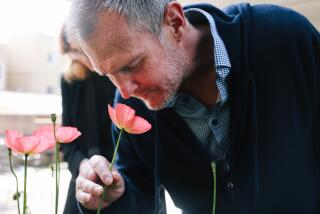Nurse Helps to Restore Tie That Binds
- Share via
Innovative thinking helped a UCI Medical Center nurse reconnect Pennsylvania family members recently with their mentally ill brother after a 17-year separation.
Nurse Alex Matamoros used the Internet and some luck to locate the family after Danny Shoaff, 47, who has been living in Orange County since at least 1993, came to the hospital to be treated for his schizophrenia.
Finding their lost brother “was an act of grace,” said Harley Shoaff, 54.
The events at the medical center underscore a common problem for the mentally ill: losing touch with family members, who are left not knowing if their loved one is alive. Experts say it is not unusual for psychiatric patients to be unable or even indifferent to keeping up with relatives.
Even when family members search for their relatives, they often are hampered by limited resources and the lack of a national clearinghouse for such information. That will change this summer when the National Alliance for the Mentally Ill launches a Web site where family members can place information about lost relatives, including photographs and other vital data.
Many experts agree that would be a vast improvement over the hit-and-miss system relatives rely on now.
Harley Shoaff said the family had been looking for his brother for years.
“Our mother died three years ago, and she was still looking for him,” he said from his home in Lancaster, Pa. “She would be thrilled to know he is alive and well and getting good care.”
Despite gaining access to Danny Shoaff’s Social Security number early this year, Harley Shoaff was only able to learn from the Social Security Administration about a month ago that Danny was still alive--somewhere.
“They would not give me any other information,” he said. “The laws are meant to protect our privacy, but they are also a tremendous impediment.”
Nurse Searches Net
That Danny Shoaff was put back in touch with his family was partly the result of luck and of UCI’s installation of Internet access at nursing station computers in the psychiatric facility.
Matamoros, who was doing Danny Shoaff’s intake examination at the unit as part of a drug clinical trial, turned to the computer for help after asking permission to talk with Shoaff’s mother. The patient said he had not spoken with her in a few years, Matamoros said.
When looking for her phone number using an Internet search engine yielded nothing, Matamoros asked for the names of other relatives. He plugged in Gary Shoaff, a brother, and the state in which the family had lived in the 1970s, Pennsylvania.
“It was amazing,” Matamoros recalled. “I only got one hit in the state of Pennsylvania. I said, ‘Oh, no. This is it.’ And dialed it immediately.”
After introducing himself to Gary Shoaff and explaining the reason for the call, Matamoros gave the phone to Danny Shoaff.
“He said, ‘Do you remember me? We used to have a dog,’ and they went off on a memory trip,” said the nurse at the UCI Neuropsychiatric Center.
It is common for people with schizophrenia or other mental health disorders to simply disappear on family members, say doctors and others in the mental health field. Patients are sometimes incapable of doing what others take for granted, including setting goals or feeling an emotional bond to families.
“The need for relationships and connections, those kind of things that the rest of us put importance in, is not there,” said Dr. Rimal Bera, who is treating Danny Shoaff at UCI.
Danny Shoaff is well-known at the hospital, where he had been treated occasionally for the last six years. A cooperative patient who sometimes neglected to take his antipsychotic medication, he got along fairly well outside the hospital, sometimes living at a board-and-care home and other times using his car to visit the beach and the mountains for weeks at a time, hospital staff said.
He had a Social Security disability pension and coverage under Medi-Cal. Without a drug or alcohol habit, he was no threat to himself or others, Bera said.
“He is a pretty happy person who enjoys life,” Bera said.
Benefits of Study
Most other patients in his position would not be admitted to a hospital, where efforts can be made to contact lost family, Bera said. Danny Shoaff benefited by being eligible for a clinical trial of a new antipsychotic drug being tested at UCI.
But for that and his relatively unusual family name, it is likely Matamoros would not have found his family, hospital staff said.
At any given time, UCI staff are unable to reach relatives for two to five of the 40 patients in the psychiatric unit, Bera said. “It is a challenge for us,” he said.
Efforts to provide help on the Internet for families seeking adults, including those with psychiatric problems, are not well-developed. The state of California, for example, has only a Web site for missing children.
The National Alliance for the Mentally Ill, a volunteer group with 200,000 members, will create by this summer a Web site exclusively dedicated to missing people with mental illnesses, said Pauline Hines, who runs the group’s National Homeless and Missing Network.
Currently, the alliance tells those searching for a family member to report the person missing to local police and obtain a National Crime Information Center number for the case. The alliance then uses the number, along with information from the family, to circulate a flier to its members, police, homeless organizations, shelters and other places in the target region.
The Shoaffs are planning a reunion soon. Harley has been calling Danny daily, and family members will travel to California to reestablish bonds with him.
While the family initially made plans to fly Danny Shoaff home, that idea has been put on hold while Danny recuperates at the hospital and gets used to the idea that he has a family who wants to be with him, hospital officials said.
“Essentially, these are people who don’t know each other now,” Bera said.
“We are thrilled,” Harley Shoaff said. “I had never given up hope, but I was very pessimistic. I just wanted to know what happened. I would see a homeless person and think that could be my brother.”
More to Read
Sign up for Essential California
The most important California stories and recommendations in your inbox every morning.
You may occasionally receive promotional content from the Los Angeles Times.













